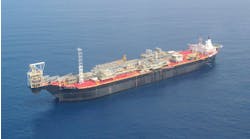27 vessels, 8,000 operations studied
Tony ReadData on dynamic positioning (DP) failure events on diving support vessels, pipelayers, and construction barges has been collected over a 20-year period by the Inter national Marine Contractors Association (IMCA) and its forerunner, the DP Vessel Operators Association (DPVOA). This has enabled the operators of such vessels to learn from others' mistakes and incidents and so progressively improve performance.
IMCA
Tanker offtake using non-DP tankers has been in operation much longer than that involving those with DP systems, but DP tankers have some advantages and some disadvantages over the units without DP.
In response to government and industry
concerns about the disadvantages of DP shuttle tanker offloading from floating production, storage, and offloading systems (FPSO) and floating storage units (FSU), IMCA and industry sponsors turned their attention to these close proximity operations and commissioned consultants Global Maritime to quantify the relative frequency of various types of incident.Their intention was to determine the base cause of stationkeeping incidents - endeavoring to learn the lessons from the long experience from shuttle tanker loading from fixed buoys.
Analysis of 26 facilities
Their report "Quantified Frequency of Shuttle Tanker Collision during Offtake Operations" contains an analysis of loading from 26 offshore export facilities, involving 27 different vessels and 8000+ offshore loading operations.The study analyzes the causes of 12 collisions, with fault trees provided for each. Two were the result of too much thrust in the DP when approaching the loading point, and one the result of the operator not being sufficiently aware of the maneuvering characteristics of the vessel.
The cause of the most significant number of actual or near miss collisions at offshore loading facilities by DP shuttle tankers can be grouped into three main areas:
- Position reference systems
- Main engine/propellers
- DP operators.
Stationkeeping
Shuttle tankers load from permanently installed FPSOs and FSUs, by positioning astern and connecting a hawser and a loading hose. If stationkeeping problems develop the hawser can be over-tensioned and break or the shuttle tanker can collide with the permanently-installed FPSO/FSU.The report endeavors to collect and analyze reports of minor failures as well as those that involved contact. Lessons can be learned from both. Some 100 reported DP incidents from 1993-98 which had more detailed data were analyzed. The breakdown of the primary causes reported is shown in the accompanying pie chart.
This breakdown goes some way towards establishing the relative criticality of equipment, but possibly because the records are built up from reports generated on board vessels, the cause "operator error" does not appear once, whereas operator error has featured in several of the collision cases.
The report concludes that not all the lessons have yet been learned, but that none of the problems are insurmountable. Areas where scope for improvement has been identified include incident reporting, management of change and operator training.
The study report was primarily prepared for the sponsors and members of IMCA. Copies are available for non-members (at cost) on application to the IMCA offices (tel. +44 (0) 171 931 8171, fax: +44 (0) 171 931 8935.
Copyright 1999 Oil & Gas Journal. All Rights Reserved.


